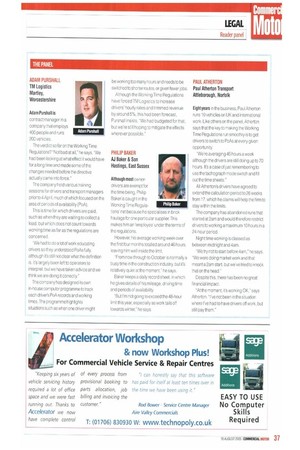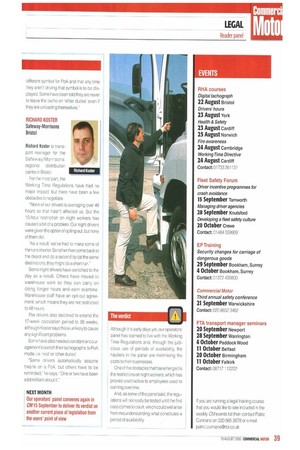THE PANEL
Page 37

Page 38

Page 39

If you've noticed an error in this article please click here to report it so we can fix it.
ADAM PURSHALL TM Logistics Martley, Worcestershire Adam Purshall is contract manager in a company that employs 400 people and runs 200 vehicles.
The verdict so far on the Working Time Regulations? "Not bad at all," he says. "We had been looking at what effect it would have for a long time and made some of the changes needed before the directive actually came into force."
The company held various training sessions for drivers and transport managers prior to 4 April, much of which focused on the area of periods of availability (PoA).
This is time for which drivers are paid, such as when they are waiting to collect a load, but which does not count towards working time as far as the regulations are concerned.
"We had to do a lot of work educating drivers so they understood PoAs fully, although it's still not clear what the definition is. It's largely been left to operators to interpret, but we have taken advice and we think we are doing it correctly."
The company has designed its own in-house computer programme to track each driver's PoA records and working times. The programme highlights situations such as when one driver might be working too many hours and needs to be switched to shorter routes, or given fewer jobs.
Although the Working Time Regulations have forced TM Logistics to increase drivers' hourly rates and trimmed revenue by around 5%, this had been forecast. Purshall insists. "We had budgeted for that, but we're still hoping to mitigate the effects wherever possible."
PHILIP BAKER AJ Baker & Son Hastings, East Sussex
Although most ownerdrivers are exempt for the time being, Philip Baker is caught in the Working Time Regula tions net because he specialises in brick haulage for one particular supplier. This makes him an 'employee' under the terms of the regulations.
However, his average working week over the first four months totalled around 46 hours, leaving him well inside the limit.
"From now through to October is normally a busy time in the construction industry, but it's relatively quiet at the moment," he says.
Baker keeps a daily record sheet, in which he gives details of his mileage, driving time and periods of availability.
"But I'm not going to exceed the 48-hour limit this year, especially as work tails off towards winter," he says. PAUL ATHERTON Paul Atherton Transport Attlehorough, Norfolk
Eight years .n the business, Paul Atherton runs 10 vehicles on UK and international work. Like others on the panel, Atherton says that the key to making the Working Time Regulations run smoothly is to get drivers to switch to PoAs at every given opportunity.
"We're averaging 45 hours a week although the drivers are still doing up to 70 hours. It's a case of just remembering to use the tachograph mode switch and fill out the time sheets."
All Atherton's drivers have agreed to extend the calculation period to 26 weeks from 17, which he claims will help the f irm to stay within the limits.
The company has abandoned runs that started at 2am and would therefore restrict drivers to working a maximum 10 hours in a 24-hour period.
Night time working is classed as between midnight and 4am.
"We try not to start before 4am," he says. "We were doing market work and that meant a 2am start, but we've tried to knock that on the head."
Despite this, there has been no great financial impact.
"At the moment, its working OK," says Atherton. "I've not been in the situation where I've had to have drivers off work, but still pay them." ED PARGETER Director. EP Training Leatherhead, Surrey With 25 years' worth of road transport industry training, Ed Pargeter fully expected a swathe of calls from worried clients struggling to cope with the Working Time Regulations.
"Most of them have found it OK. We said to clients 'Get back to us if you have any problems' and, so far, we've had no feedback.
"I only know of one company, which has around 450 drivers, which budgeted for El m in extra drivers' costs."
Pargeter believes the definition of periods of availability will be crucial in the months and years ahead.
"Once there have been a couple of prosecutions then people will really start to take note of it," he says.
GERARD PALMER Huntapac Transport Tarleton, Preston Gerard Palmer oversees a 36-strong fleet in a company that grows and distributes fresh produce. Four months into the regulations, he is grateful for the time they spent preparing for them.
"We spent 18 months looking at it, even setting up a study group with two drivers, a despatch manager and myself.
"One of the first things we agreed was an extension to 26 weeks because our business peaks at Easter and Christmas.
"We even produced a special drivers' handbook detailing the working time issues and explaining periods of availability."
Drivers are given a special time sheet for PoAs and told what sort of waiting time to expect at a distribution depot when they get their despatch paperwork.
This counts as a PoA. If it looks like going over the expected time, drivers are encouraged to ring the depot for advice since anything over the expected time could count as working time. Gerard Palmer "So far. we've only had one driver do over 60 hours in a week," says Palmer. "But they are all averaging less than 48.
"We do fridge work and bulker work, which has fewer PoAs. So if someone is coming up on their hours doing bulker work, we just switch them to a fridge unit for awhile."
The company uses an outside tachograph analysis company to help it keep track of hours and reckons it's had to spend no more than £500 a year extra in administration to accommodate the regulations.
NEIL JAMES Hunts of Redditch (Removers) Redditch Neil James has been at the head of this removal firm for 15 years.
As a specialist in international as well as domestic removals, he says it's the 60-hour a week maximum rather than the 48-hour average — that is causing the biggest headaches.
"In the UK, it's not an issue. But when we do jobs to Spain and France, they are only just within the 60-hour limit.
III==111
"That's more of a problem than the average working hours because some jobs to the Continent can take a week."
But drivers have agreed to extend the calculation period to 26 weeks, or six months instead of four. "We are pretty much working as before, with nobody going over the 48-hour average," says James.
The company's existing pay structure meant there was no incentive for drivers to work longer hours anyway.
Each UK driver is guaranteed an overtime rate for two hours in the normal working day and on the Continent, it's four hours a day.
"That way they get the job done a lot quicker," says James. NICK MATTHEWS Denholm Industrial Services Yeovil. Somerset Logistics manager Dick Matthews is responsible for a fleet of 79 vehicles, most of which supply scaffolding.
"A lot of people were scaremongering about the Working Time Regulations, but all it requires is a bit of forward planning," he says.
"We have a complete tacho analysis programme and that helps a lot. But we only have three HGV drivers so we just share out the workload between them. The rest are a whole raft of men driving 7.5-tonners, although that's not their primary function."
The company contracted a specialist training firm to brief staff on the changes, especially PoAs, and it has also secured an extension to 26 weeks.
"Nobody is really going to understand PoAs until it goes to a test case," says Matthews. "But we are making the fullest legal use of those periods."
JOHN HUNT John English Coventry A driver with 20 years experience, John Hunt drives to Germany every week, but has felt little impact from the Working John Hunt Time Regulations.
"It isn't as demanding as it sounds. I usually drive about 40 hours a week and most of my deliveries and collections are regular. They often involve very little in the way of waiting time, or loading and unloading time."
But, Hunt adds, feedback from other drivers suggests a great deal of confusion over who defines what a period of availability is.
"Drivers are mostly unaware of what constitutes a PoA. Employers seem to be equally unaware and quite often mislead the drivers with what they think is correct. in the hope of gaining more productivity from the driver.
"Some are being told they must use a different symbol for PoA and that any time they aren't driving that symbol is to be displayed. Some have been told they are never to leave the tacho on 'other duties even if they are unloading themselves."
RICHARD KOSTER Safeway-Morrisons Bristol Richard Koster is transport manager for the Safeway/Morrisons regional distribution centre in Bristol, For the most part, the Working Time Regulations have had no major impact. but there have been a few obstacles to negotiate.
"None of our drivers is averaging over 48 hours so that hasn't affected us. But the 10-hour restriction on night workers has caused a bit of a problem. Our night drivers were given the option of opting out. but none of them did.
"As a result. we've had to make some of the runs shorter. So rather than come back to the depot and do a second tip (at the same destination), they might do a short run."
Some night drivers have switched to the day as a result. Others have moved to warehouse work so they can carry on doing longer hours and earn overtime. Warehouse staff have an opt-out agreement, which means they are not restricted to 48 hours.
The drivers also declined to extend the 17-week calculation period to 26 weeks, although Koster says this is unlikely to cause any significant problems.
Some have also needed constant encouragement to switch their tachographs to PoA mode, i.e. 'rest' or 'other duties'.
"Some drivers automatically assume they're on a PoA, but others have to be reminded," he says. "One or two have been a bit militant about it."
NEXT MONTH
Our operators' panel convenes again in CM15 September to deliver its verdict on another current piece of legislation from the users' point of view
















































































































































































































